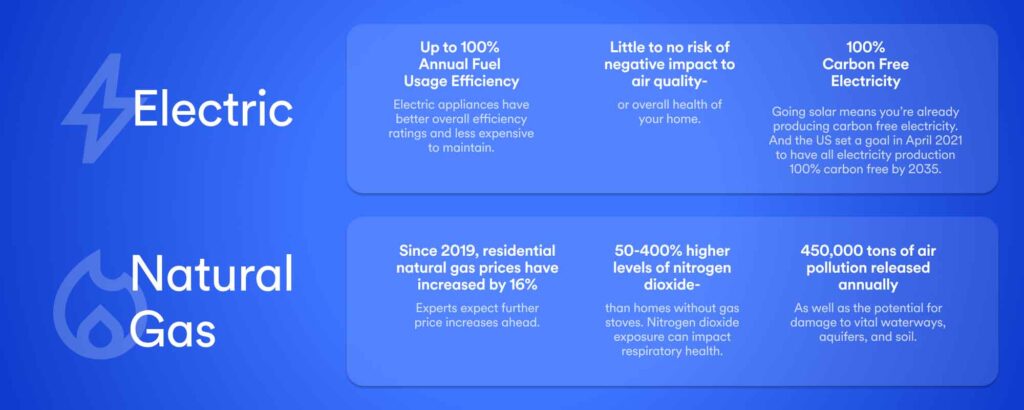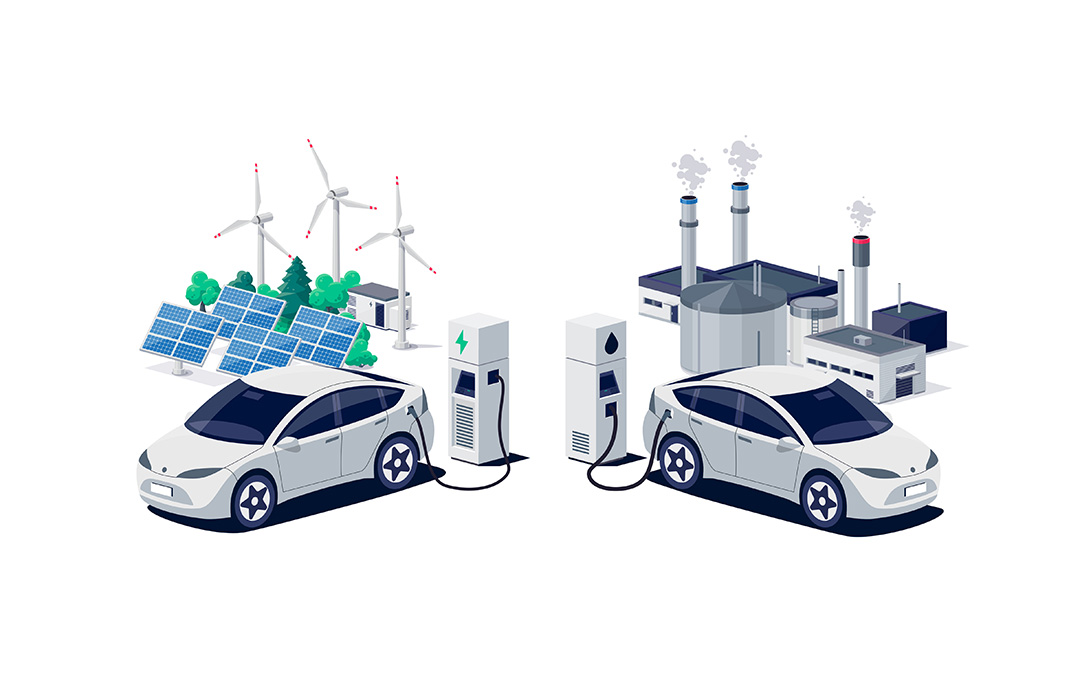If you’re an Oregon homeowner deciding to make the switch to solar, the desire to save money on utilities is likely a driving concern. With rising utility costs for homes across Oregon, the opportunity to wipe out your power bill and generate all electricity needs right on your rooftop is attractive.
However, if you’re one of the roughly 48% of Americans who use natural gas to power their homes, even a switch to solar won’t see you completely owning your power. If you’re considering going solar, it’s worth entertaining the move from natural gas in Oregon to a fully electric home to make the most of your power.
With concerns from environmental impact to reduced air quality in your home, Oregonians have a variety of reasons to weigh whether electric or natural gas-powered appliances are the best choice for home.
Is There a Reason to Keep Natural Gas at Home in Oregon?
The age-old argument for sticking with natural gas as a power source for your home appliances is to save money. However, Oregon homeowners are seeing rising natural gas prices again this year.
The rising rates from providers like NW Natural Gas and Avista, coupled with the efficiency of electric appliances, means natural gas stops being the most obvious choice. Energy efficiency is higher for electric appliances; from furnaces to dryers, natural gas and electric appliances generally have the same expected lifespan.
If you have a solar system installed that generates your electricity for free, your savings grow even more. Switching to all-electric can be easy, given that almost all homes in Oregon are already wired and ready to go for a connection to the local electrical grid. However, uninstalling natural gas from your home comes with a cost.
To ensure that the gas line attached to your home doesn’t leak and become a safety hazard, you’ll need to arrange to have your natural gas supplier come out and cap the line.
Without cost as the main reason for sticking with natural gas, another reason might simply be preference. Oregon foodies who aspire to be at-home chefs, or large families who want to avoid arguments about who used up all the hot water, might find natural gas appliances meet their expectations better than the electric appliances available to them.
So if your spouse loves to flambé, and your last family reunion was a fiasco when an uncle used up all the hot water before grandma got a chance to shower, you might prefer natural gas.
Still, it’s important to understand the drawbacks natural gas use in your home can have.
What are the Drawbacks of Natural Gas in Oregon?
Fracking is likely the top reason you can think of for a reason to not use natural gas.
The process for extracting natural gas has serious risks including chemical spills, degradation of the water supply, and overuse of public water sources in areas already at risk for droughts. Which is why projects like the LNG pipeline have faced stout opposition in Oregon and across the U.S.
Beyond the environmental concern, there are other lesser known issues with natural gas use in the home. A joint study from Rocky Mountain Institute, Mothers Out Front, and Physicians for Social Responsibility found that just using a gas stove can produce elevated levels of Nitrogen Dioxide.
Raised levels of Nitrogen Dioxide in the home can lead to a variety of respiratory and cardiovascular issues, which is especially concerning for children and the elderly.
Beyond this emerging cause for alarm, most of us are already aware of the risk of carbon monoxide poisoning from natural gas in our homes. Even with the addition of that rotten egg smell to help alert you, natural gas lines connected to your home are an ever-present risk factor for possibly deathly leaks.
What Are the Perks of an Electric Home?
Conversely, electricity in the home is overwhelmingly safe.
All electric appliances in your home can also mean savings from better energy efficiency, and the option to unplug any lurking vampire appliances sucking up extra electricity to increase your savings. Plus, with electric appliances, there isn’t the risk of unsafe levels of nitrogen dioxide or gas leaks.
Beyond these easy reasons, an all electric home means you can take advantage of technological advancements in home appliances.
In recent years we’ve seen the price of induction stovetops decrease, and increased availability and capability of on-demand and tankless water heaters. Both are incredibly efficient for their uses, and can further save you money.
For Oregon homeowners looking to go solar, concerns about their home’s environmental impact also factor into the decision. Switching from gas to electric means that you’ll not only get to make the most of your solar power system, but can feel even better about how green your home energy system is. Keeping Oregon green is something each of us can have a part in.
While natural gas impacts the land, water, and air, Oregon is seeing more and more of its electricity come from clean sources like hydroelectric, wind, and solar. Even power companies that are still currently using natural gas-powered plants, like those run by PGE and Pacific Power, will soon need to make changes to meet the country-wide move towards 100 percent carbon pollution-free electricity announced in April of 2021.
Whether you go solar or not, non-electric appliances like oil-burning stoves and gas water heaters seem fated to go the way of the dinosaurs.
Why Wouldn’t Someone Switch to Electric?
Given how easy it can be to electrify your home, the better safety and efficiency, and the options for saving money, you might wonder why every Oregonian would stick with gas.
Well, because it can be expensive. Buying new electric appliances can be a major undertaking, especially if your current natural gas appliances are nowhere near the end of their lifespan. And if you live in a historic home in Ashland or Portland, depending on the age of your home’s electrical system, additional appliances plugging in may also require an upgrade.
Finally, homeowners must cover the cost to cap natural gas lines that are no longer in use.
The great news for homeowners looking to go solar is that your lifetime savings will quickly compensate for any costs associated with converting your house to all electric appliances. Plus, there may be rebates and incentives for switching to energy efficient electric appliances from Oregon and the federal government.
The Verdict: Electric or Natural Gas in Oregon?
With higher lifetime savings, better safety, and the reality that parts of Oregon are already moving away from natural gas altogether, all-electric businesses and homes are visible over the horizon. For any homeowner considering making the switch to all-electric home appliances right now, it might boil down to cost and affordability.
Luckily for homeowners considering the switch to solar, the monthly savings you’ll see from wiping out your power bill will quickly pay for converting your appliances to all-electric.
If you’re ready to take the first step and determine if your roof qualifies for our zero-down program, it’s as simple as answering a few quick questions. Purelight Power can help make the switch to electric appliances and solar simple.






